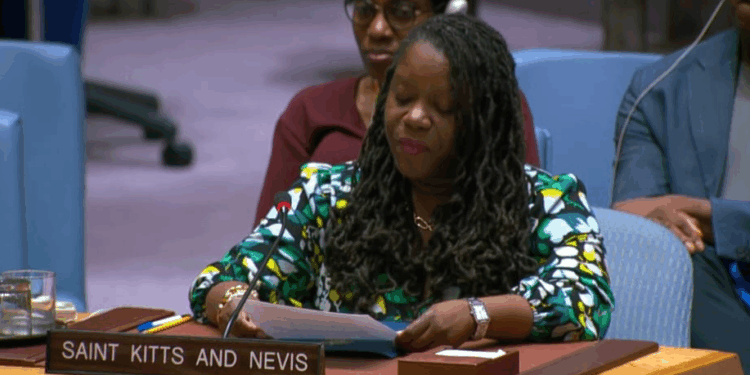Addressing Grave Violations Against Children in Armed Conflict: CARICOM’s Strategies for Prevention and Cessation (Delivered by St. Kitts and Nevis to the UN Security Council)
On July 12, 2023, St. Kitts and Nevis, representing the Caribbean Community (CARICOM), delivered a powerful statement at the United Nations Security Council Open Debate on Children and Armed Conflict. The statement underscored the devastating impact of armed conflict on children and advocated for strengthened global action to protect them from grave violations. It called for a multi-faceted approach encompassing prevention, protection, accountability, and reintegration, emphasizing the importance of collaboration among member states, UN agencies, and civil society organizations.
The CARICOM statement highlighted the profound and lasting consequences of armed conflict on children. It drew attention to the horrific realities children face, including recruitment and use by armed groups, killing and maiming, sexual violence, abduction, attacks on schools and hospitals, and denial of humanitarian access. The statement stressed the urgent need to address the root causes of conflict, such as poverty, inequality, and political instability, which create environments where children are particularly vulnerable to exploitation and abuse. It also emphasized the importance of promoting peaceful conflict resolution and sustainable development to create a safer world for children.
A key element of the statement was the call for enhanced prevention mechanisms. CARICOM urged member states to strengthen their national legal frameworks, criminalizing all forms of grave violations against children in armed conflict. It emphasized the importance of integrating child protection considerations into all peace and security operations and advocated for increased funding for programs aimed at preventing child recruitment and other violations. The statement also highlighted the critical role of education in empowering children and building resilience within communities affected by conflict. Promoting education, according to the statement, can equip children with the knowledge and skills to navigate challenging circumstances and contribute to peaceful societies.
The CARICOM statement also underscored the importance of protection and accountability. It called for strengthened monitoring and reporting mechanisms to track grave violations against children and to hold perpetrators accountable. It stressed the need for timely and impartial investigations into alleged violations and urged the Security Council to refer situations of grave concern to the International Criminal Court. The statement emphasized the importance of ensuring access to justice for child victims and providing them with comprehensive psychosocial support and rehabilitation services. It further urged the international community to cooperate in the apprehension and prosecution of individuals responsible for crimes against children.
Furthermore, the statement highlighted the importance of reintegration programs for children affected by armed conflict. CARICOM emphasized the need for tailored support systems to help children reintegrate into their families and communities, including access to education, healthcare, and psychosocial services. It acknowledged the specific challenges faced by girls formerly associated with armed groups, including stigma and discrimination, and called for targeted interventions to address their needs. The statement also stressed the importance of community-based reintegration programs that involve families and local leaders to ensure sustainable reintegration and prevent recidivism.
In closing, the CARICOM statement reaffirmed the region’s unwavering commitment to protecting children from the scourge of armed conflict. It called on the international community to prioritize the rights and well-being of children in all peace and security efforts. It urged for increased resources for child protection programs and encouraged greater collaboration among member states, UN agencies, and civil society organizations. The statement served as a powerful reminder of the international community’s shared responsibility to protect children and end grave violations in armed conflict, emphasizing the need for sustained global action to ensure a future free from violence and exploitation for all children. CARICOM’s call to action reflected the urgent need for a concerted global effort to protect children, hold perpetrators accountable, and break the cycle of violence.
Share this content:












Post Comment